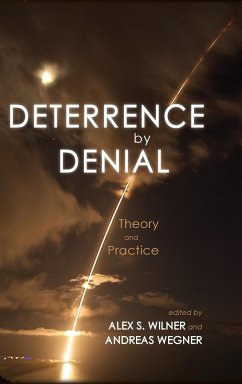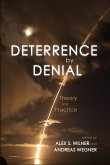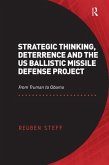*This book is in the Rapid Communications in Conflict and Security (RCCS) Series (General Editor: Geoffrey R.H. Burn). Deterrence theory helps conceptualize how threats can be used and communicated to influence or alter an adversary's behavior. In practice, deterrence works by weighing on an actor's perceived costs and benefits of pursuing an unwanted action. Deterrence-and its close relatives, coercion, compellence, dissuasion, and influence-can be accomplished by using threats of punishment (i.e., retaliation) or by denying adversaries the gains they seek (i.e., defense, resilience, and failure). During much of the Cold War deterrence by punishment largely overshadowed deterrence by denial. The proliferation of nuclear weapons, and later, of missile technology, tipped the deterrent calculus in favor of retaliation: the ultimate weapon epitomized the ultimate deterrent. Deterrence by denial largely fell to the wayside as a result and the logic of punishment came to pervade the classical literature on deterrence theory. Contemporary security dynamics, however, have changed dramatically. Security concerns are increasingly sub- and non-state in nature, and they are much more diffused. While nuclear weapons and deterrence by punishment still matter, the rise of sophisticated international terrorist organizations, conventional military challenges, digital-based threats, and threats short of open conflict have today cumulatively tipped the deterrent calculus in favor of denial. Deterrence by denial reduces the perceived benefits an action is expected to provide an adversary. Decision making takes into account both costs and benefits, so while punishment manipulates behavior by augmenting costs, denial works by stripping away benefits. Unfortunately, given the field's longstanding focus on deterrence by punishment, very little research has systematically explored denial theory and strategy in contemporary security settings. And the limited denial scholarship that does exist rests largely on the dynamics inherent to the Cold War, like great power rivalry, strategic weapons, and military power. Deterrence by Denial: Theory and Practice is the first study to focus exclusively on contemporary denial, bridging the theoretical gap that persists between classical deterrence theory and contemporary insecurity. The book significantly advances the scholarship on deterrence by denial with empirically driven and policy-relevant contributions written by leading international scholars of conventional military aggression, missile defense, terrorism and militancy, crime, and cybersecurity. Deterrence by Denial: Theory and Practice is an important and unique book, of interest to scholars of international relations, political science, terrorism and intelligence studies, and cybersecurity, as well as to policy analysts, practitioners, and members of the armed forces and intelligence community.
Hinweis: Dieser Artikel kann nur an eine deutsche Lieferadresse ausgeliefert werden.
Hinweis: Dieser Artikel kann nur an eine deutsche Lieferadresse ausgeliefert werden.








